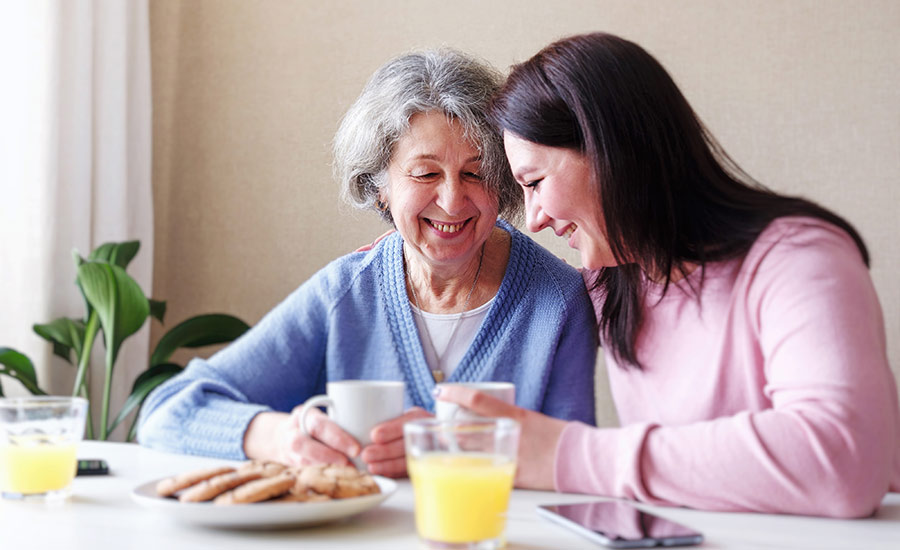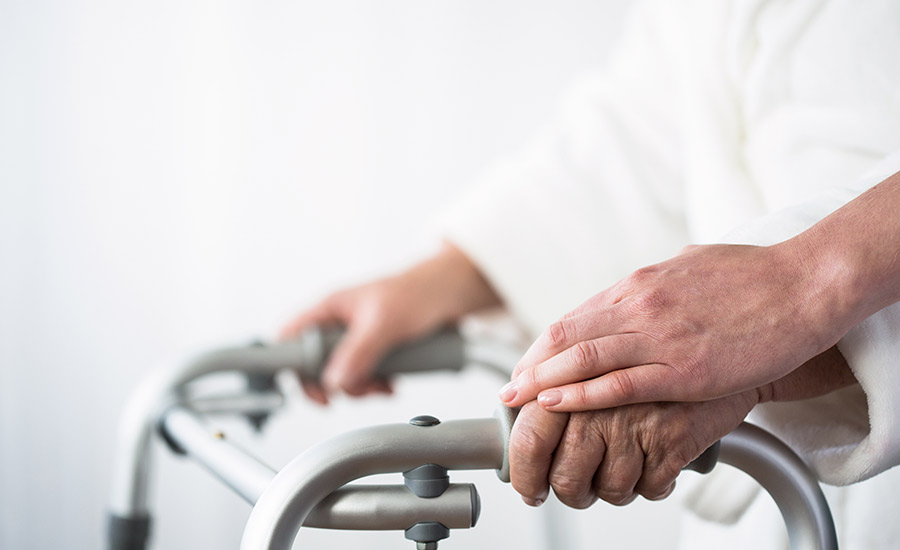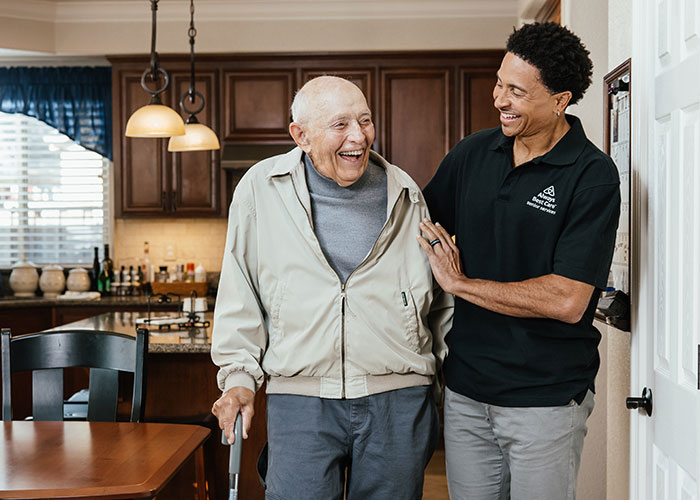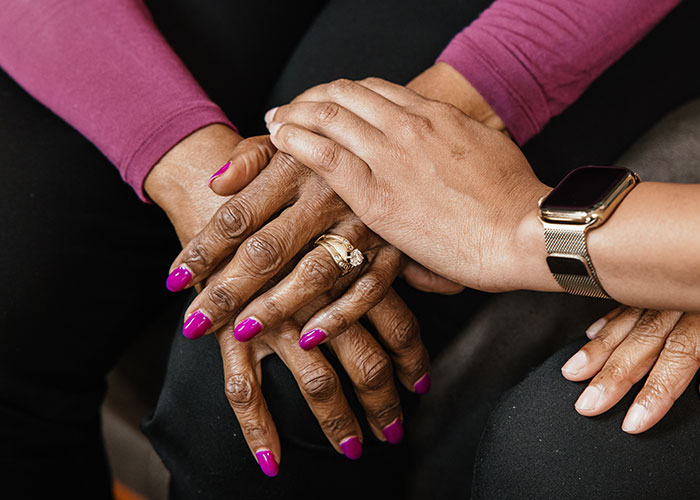How To Provide After Hospital Care for the Elderly

Research shows that the elderly represent the most hospital admissions in the United States compared to other age groups.
If your elderly loved one has spent time in the hospital, you might find that their recovery and adjustment period at home requires careful planning and attention.
It’s important to make sure that their post-hospitalization needs are met, which range from medication reminders to emotional support and beyond.
If you’re not sure how to help your loved one regain their independence after spending some time in the hospital, we’re here to help.
We’ll share how to provide after hospital care for the elderly and answer frequently asked questions surrounding life post-hospital stay.
Table of Contents
Considerations for Elderly Care After Hospital Discharge
To make sure your elderly loved one seamlessly transitions back to their daily life after a hospital discharge, it’s important to address several key factors, such as their living conditions and medications reminders.
Considerations for elderly care after hospital discharge include:
- Patient restrictions and activities
- Special diets, such as low-sodium for heart health or high-fiber diets for digestive issues
- Medication reminders
- Follow-up care
- Home safety
- Equipment and supplies, such as oxygen tanks or wound care supplies, when needed
- At-home care plan
How To Provide After Hospital Care for the Elderly
Caring for your elderly loved one after a hospital stay requires understanding their medical needs and creating a safe home environment to prevent falls and accidents.
To provide the best care for your elderly loved one post-hospital:
- Understand discharge instructions: Review the discharge summary for details on your loved one’s condition, treatment, and care instructions. Clarify any doubts with the healthcare team and take notes before leaving the hospital.
- Plan the next check-up before leaving the hospital: Schedule follow-up appointments with your loved one’s primary care physician to help monitor their recovery progress and address any health concerns promptly after discharge.
- Talk to your loved one’s doctor about their medications: Consult your loved one’s doctor about their prescriptions, including their dosage and potential side effects. In addition, ask about existing medications to make sure there are no harmful interactions with the new prescriptions.
- Manage appointments and medications: Keep track of your loved one’s medications and make sure they take them correctly with medication reminders. Schedule their medical appointments and monitor any changes in their health.
- Monitor symptoms: Be aware of potential complications after your loved one’s hospital discharge. For example, look out for symptoms such as increased fatigue, difficulty breathing, swelling in the limbs, sudden confusion, or worsening pain, as these can be indicators of serious health conditions that can require immediate medical attention.
- Gradually reintroduce routines: Re-establish your loved one’s routine after their hospital stay to help them regain a sense of normalcy and stability. For example, start with simple activities, such as their usual morning coffee and bedtime rituals, and gradually include more elements like mealtimes and exercise as they gain their strength.
- Manage wound care: Apply wound care techniques as instructed by your loved one’s healthcare professional, making sure that any surgical sites or injuries are properly dressed and cleaned. Monitor wounds for signs of infections, such as redness, swelling, or unusual discharge, and report any concerns to a doctor promptly.
- Adjust home layout: Follow a home safety checklist to make sure you’re your loved one is living in a safe environment. Eliminate tripping hazards, such as unrepaired floor cracks, clutter, and cords. Install handrails on stairs and grab bars in the bathroom and place anti-slip mats around the sink and shower.
- Equip your loved one with supportive devices: Make sure that your loved one utilizes assistive tools like canes, walkers, or mobility scooters if they’re necessary for added stability and balance. This will aid in safer mobility and independence.
- Use a personal emergency response system (PERS): Consider using a medical alert system or PERS device, such as a necklace with a help button, so your loved one can call for help in emergencies.
- Assist with daily activities: Help your loved one bathe, groom, or get dressed, as these tasks can be challenging, especially if mobility is limited.
- Promote social activities: Encourage your loved one to participate in recreational activities, such as going on a picnic, attending local social events, book clubs, or senior center activities, to help prevent feelings of isolation.
- Schedule check-ups: Regular check-ups can help identify potential health issues early on, track the progress of existing conditions, and adjust treatments as necessary.
- Make sure your loved one is eating a balanced diet: Eating foods that are rich in fresh vegetables, lean proteins, and whole grains can help boost their energy levels, foster a strong immune system, and maintain overall health.
- Offer companionship: Provide emotional support for your loved one, as their mental and emotional health is just as important as their physical recovery. Engage in conversations or simply be present to help prevent feelings of loneliness and anxiety that can occur post-hospitalization.
- Celebrate small wins: Whether it’s getting dressed on their own or managing to take a few steps without assistance, acknowledging these milestones in regaining independence can help boost your loved one’s confidence and morale.
- Consider physical therapy or rehabilitation: Encourage your loved one to actively participate in prescribed physical therapy and rehabilitation exercises. These activities are crucial for regaining strength, improving mobility, and enhancing overall physical function, which can speed up the recovery process after hospital discharge.
- Coordinate with healthcare providers: Maintain regular communication with your loved one’s physician to keep them updated on any changes in health or response to treatments, whether it’s reporting any new symptoms or reactions to medications.

Explore Dependable Elderly Care at Always Best Care
For over 25 years, our steadfast dedication to providing high-quality care has been a cornerstone of our service, making us a proud provider of senior care in over 225 territories across the United States and Canada.
Our senior care services include:
- Respite care services: We offer temporary care solutions, giving you the flexibility to manage other responsibilities while making sure your loved one is well-cared for.
- In-home care services: We provide comprehensive in-home care services that cover a wide range of needs, from around-the-clock support to daily tasks, such as safety supervision, laundry, meal preparation, housekeeping, medication management, bathing, grooming, and dressing.
- Skilled home health care services: We can create a personalized home care plan for your loved one with specific care needs. Our personalized plans include managing wound care, providing caregiver education, and supporting patients with incontinence.
- Specialized home care services: We leverage cutting-edge technology, such as personal emergency response systems, remote patient monitoring, and balance tracking system, to provide continuous support for your loved one’s health.
- Senior living referral services: We can help you find the ideal senior living community, matching your loved one’s needs and preferences with the best available options.
- Veterans assistance program: We help veterans get financial support for medical care, as a gesture of gratitude for their service.
At Always Best Care Senior Services, our dedicated caregivers are passionate about delivering exceptional care and support to everyone who needs it.
FAQs About Elderly Care After Hospital Discharge
Still have questions about elderly care after hospital discharge? Find the answers to the commonly asked questions below.
What is post-hospital syndrome?
Post-hospital syndrome refers to a temporary condition that can occur due to the impact of the patient’s initial illness and their vulnerability following a hospital stay.
The condition typically lasts for seven weeks after a patient is discharged from the hospital.
What role does physical therapy play in post-hospital care?
Physical therapy can help patients regain strength, mobility, and independence after an illness, injury or lengthy hospital stay.
Can a hospital discharge a patient with nowhere to go?
Yes, a hospital can discharge a patient with nowhere to go — under one condition. The hospital should make sure that a patient has a suitable living arrangement or care plan in place before discharge.
This can include arranging for home health care, rehabilitation facilities, or other forms of support if needed.

Wrapping Up on After Hospital Care for the Elderly
Providing after hospital care for the elderly requires careful planning and attention to different aspects of their health and well-being.
By helping your loved one make a safe transition from hospital to their home, you can help speed up their recovery and improve their overall quality of life post-discharge.
At Always Best Care, we strive to make sure that your loved one receives the highest quality of care and support.





